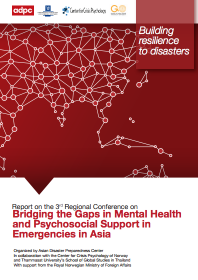- About Us
-
Who we are
-
- Publications
-
- ADPC Academy
-
MediaADPC'S NEWS
Officials discuss the need to improve mental health support, post-disaster Officials discuss the need to improve mental health support, post-disaster
4 - 5 Feb 2013
Bangkok , Thailand
The effects of a disaster last long after the debris has been cleared away. The 2nd Regional Conference Promoting Psychosocial Support and Recovery in Emergencies in Asia, held in the Imperial Queen's Park Hotel on 4-5 February 2013 explored solutions to overcome challenges surrounding mental health support for individuals and communities in the wake of a disaster.
Disaster response often focuses on people's immediate physical health. Dr. Atle Dyregrov, the Director of the Center for Crisis Psychology, Norway spoke of four siblings whom he met in a hospital in Rwanda. Both of their parents had died, and the elder two siblings had carried their infant twin sisters for 70km to a crisis hospital. The children were orphans, and had no known support system, but when Mr. Dyregrov returned the next day, they had been discharged, as they had no physical injuries.
Child neglect, child abuse and domestic violence often increases dramatically post-crisis.
Ms. Unni Marie Heltne, a Clinical Psychologist from Center for Crisis Psychology, quoted some children’s post-disaster reactions, “it's not the flooding that's the worst thing to me, the worst is that in the evening, daddy beats mummy and I'm afraid that he'll kill her”; “it's not the shooting, soldiers or the bombs that scare us the most...we have nightmares about when mother and father get mad at us and beat us”.
In many cultures, the average incident of severe child abuse is between 3-5% of the population. Ms. Heltner spoke of studies finding incidence of up to 70% in some studies of post-disaster family situations. There are many reasons for this. Disasters create traumatized adults, significantly increase substance abuse, and result in societal fragmentation, which can increase the burden on caretakers and increase stress levels.
Long-term care a must
The importance of focusing on long-term care, rather than the acute period after a disaster is a repeated theme discussed. Professor Richard Bryant of New South Wales University spoke about studies following Hurricane Katrina, which found much higher rates of Post Traumatic Stress Disorder (PTSD) and suicide attempts 18 months after the disaster, rather than 6 months afterwards. This may be because basic community infrastructure was ruined, and people were under chronic rather than acute stress; people were getting worn down.Understanding of how to best support the mental health of individuals has changed over the last decade. Whilst Critical Incident Stress Debriefing (CISD) has many positive aspects, there is now evidence that confronting people with memories of the disaster very quickly after the event can do more harm than good.
Professor Bryant commented, “It can activate the memories, participants get very distressed, and then they're left with that. Psychological First Aid (PFA) [the current preferred support system] and CISD are the same thing, except PFA really does not pressure people to talk about the experience”.
Together, participants are presenting and thinking through ways to improve mental health support in post-disaster and crises situations. For more information on the outcomes of the conference please contact: Dr. Pir Mohammed Paya at paya@adpc.net or Ms. Janette Lauza Ugsang at janette@adpc.net .
ADPC thanks the Royal Government of Norway and the Norwegian Center for Crisis Psychology for their collaboration and generous support in organizing this conference.
Related PublicationsLatest NewsRelated Trainings
-


